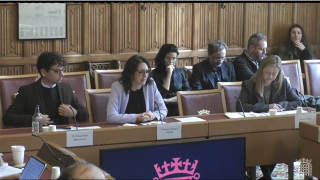
During an Adjournment Debate called by Nia Griffith MP on 17 June, Alistair Burt MP, FCO Minister with responsibility for defence policy, elaborated on the UK’s approach to lethal autonomous robotics (LARs).
In response to Nia Griffith’s speech, Minister Burt went further than in previous UK statements on this matter when he stated that LARs “will not” be able to meet the requirements of international law:
“As I had the chance to read the hon. Lady’s speech before the debate, I noticed that she used the phrase “Furthermore, robots may never be able to meet the requirements of international humanitarian law”. She is absolutely correct; they will not. We cannot develop systems that would breach international humanitarian law, which is why we are not engaged in the development of such systems and why we believe that the existing systems of international law should prevent their development.”
Echoing remarks made in May 2013 at the Human Rights Council, the Minister explained that the UK does not intend to formalise its stance against LARs in a national moratorium.
During the debate the Minister went on to state that the UK has “no plans at present” to develop LARs, apparently leaving open the possibility that LARs could be developed by the UK in the future. This position appears to be at odds with Minister Burt's earlier remarks that LARs will not be able to meet the requirements of international humanitarian law.
UNA-UK will continue to work with its partners in the Campaign to Stop Killer Robots in calling for the UK to clarify and formalise its policy on lethal autonomous robotics.
Image: The Campaign to Stop Killer Robots' mascot outside Parliament at the launch event in April 2013






